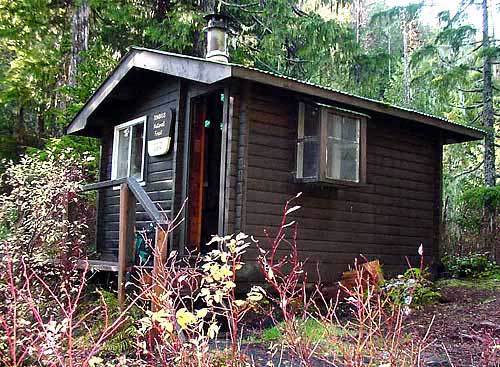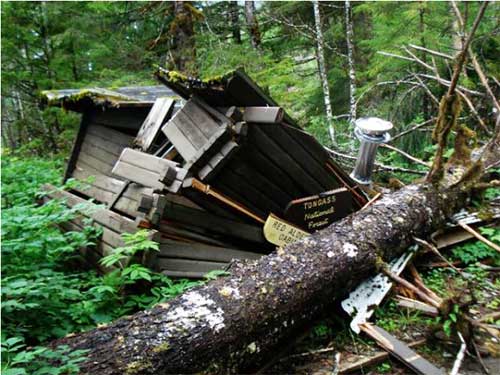
Low use, increasing costs, dwindling budgets force closure of some Forest Service cabins
September 10, 2014
Wednesday PM
(SitNews) Ketchikan, Alaska - Tightening a budget, whether for your family or for the federal government, can be stressful, difficult, sad, and sometimes even painful. The Tongass National Forest took a necessary step this week as it finalized the decision to remove 10 low-use public recreation cabins.
On Sept. 8, Forest Supervisor Forrest Cole signed the final Decision Notice and Finding of No Significant Impact for the Tongass National Forest Sustainable Cabin Management Environmental Assessment. The decision affects 12 cabins on seven ranger districts. The final decision is nearly the same as the draft decision that was sent to the public in March 2014.
In the final decision, the Forest Service will convert Distin Lake Cabin, located in Admiralty Island National Monument back to a three-sided shelter as originally constructed by the Civilian Conservation Corps. The Forest Service will remove 10 other cabins and monitor the condition and use of Checats Lake Cabin for potential closure in the future.

Checats Lake Cabin is a rustic style 12' X 12' Pan Abode cabin
with sleeping space for 4.
Photo courtesy USFS
The Forest Service will continue to rent the Checats Lake Cabin through the National Recreation Reservation System and provide minor maintenance. However, the cabin will only remain open as long as the Forest Service can keep its primary structural elements in a safe, serviceable condition. Also, use of the Checats Lake cabin must remain at or above 10 reserved nights per year to remain open.
Three cabins; Beaver Camp, Big Goat Lake, and Red Alders, located within the Ketchikan Ranger District, will be removed. Maksoutof Lake and Rezanof Lake Cabins on the Sitka Ranger District will be removed. Harvey Lake Cabin and DeBoer Lake Cabin on the Petersburg District will be removed, but the trail from saltwater to Harvey Lake will remain available for public use.
Wrangell Ranger District’s Binkley Slough Cabin will be removed. The McGilvery Cabin within the Thorne Bay Ranger District will be removed. Finally, Square Lake Cabin within the Yakutat Ranger District will be removed. No cabins are being removed from the Juneau Ranger District.
In March 2014, a draft Decision Notice was released and a “Pre-decisional Administrative Review Process,” better known as an “objection” period, began. No objections were received on the draft decision during the 45-day objection period.

The Red Alders Cabin, near Ketchikan, was crushed by a tree
in 2012. This cabin will be removed.
Photo courtesy USFS
“Many people saw this decision when it went out in March. We are just finalizing the decision at this stage…and while public comments certainly point to people’s frustration over the loss of these cabins, they also, largely agree that these are cabins that receive little use and are not as important as other cabins on the Tongass,” said Cole.
“Our goal with this project was to keep popular cabins and remove structures that have very low use, safety hazards or access that has become a challenge,” said Recreation, Lands, Minerals, Heritage, and Wilderness Staff Officer Carol Goularte.
“Many of these cabins were very difficult to access, received low use, and were already in poor condition when removal or replacement was first considered years ago,” said Goularte. “With lack of funding for maintenance and with the advancement of time, the cabins have continued to deteriorate. As time goes on, most of these facilities are becoming more unsafe and most are beyond repair so it is the prudent thing to do.”
As recreation funding continues to decline, it is no longer possible for the Tongass National Forest to maintain all of the forest’s trails, cabins, campgrounds, buoys and visitor centers that residents and visitors use and enjoy. Over the last 10 years, the recreation budget has plunged more than 60 percent, with further reductions projected in the future.
“It is not going to get any easier to maintain the public use cabins in the future unless declining budgets reverse,” said Goularte. “As we move forward, our goal is to work with the public and develop innovative solutions to sustain as many of our facilities as we can. We really need assistance from recreation users.”
One way the public can help sustain the Tongass cabin program is to use their favorite cabins regularly throughout the year, supporting them with fee dollars by reserving the cabins using www.recreation.gov.
“Reserving and using them regularly helps,” said Goularte. “It shows us that the public wants to keep certain cabins. We have and will continue to take that into consideration as we look at future options for the cabin program.”
The public can also help the Tongass remote cabin program by sharing their positive experiences at Tongass cabins with others and letting them know how they can reserve, use, and support the cabins.
“The more people know about Tongass cabins and value the fact that their fees pay for maintenance and upkeep validates that people really want to keep them,” Goularte added.
There are other ways for the public to assist. When using a Forest Service cabin, conserve the firewood or bring your own wood. Clean up after yourself and previous visitors, including packing out trash. Inform the Forest Service of cabin conditions, especially if something needs immediate maintenance before conditions worsen. Follow instructions for oil stoves to minimize maintenance and clean-up needs and costs.
As the Forest Service eliminates some of the least used cabins and concentrates its efforts on caring for the most desired cabins on the forest, officials will continue seeking other creative ways to sustain the overall recreation program through partnerships and expanding outfitter and guide opportunities.
“As partners and neighbors with communities in Southeast Alaska, we will work together to explore options for the future that are fiscally sustainable and focused on those things that make the Tongass unique,” said Cole.
“There is some good news in regards to our cabin program,” said Goularte. “Even though we have to remove a handful of remote cabins, there are still hundreds of cabins on the Tongass National Forest remaining for people to enjoy. But, we need to continue working hard, and with the public’s help, we can sustain the program for years to come.”
Edited by Mary Kauffman
Source of News:
U.S. Forest Service
www.fs.fed.gov
Publish A Letter in SitNews
Contact the Editor
SitNews ©2014
Stories In The News
Ketchikan, Alaska
|
Articles &
photographs that appear in SitNews may be protected by copyright
and may not be reprinted without written permission from and
payment of any required fees to the proper sources.
E-mail your news &
photos to editor@sitnews.us
Photographers choosing to submit photographs for publication to SitNews are in doing so granting their permission for publication and for archiving. SitNews does not sell photographs. All requests for purchasing a photograph will be emailed to the photographer.
|
|


